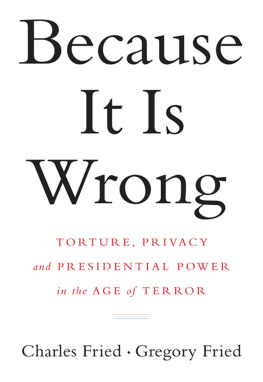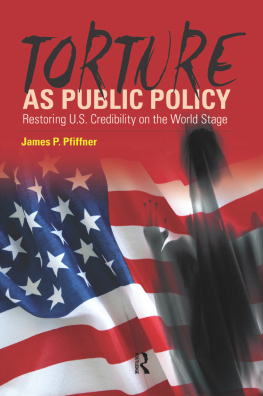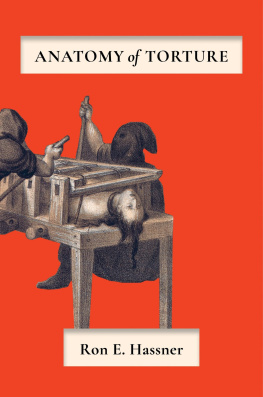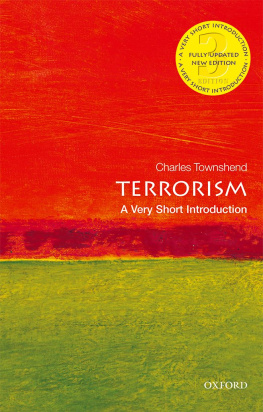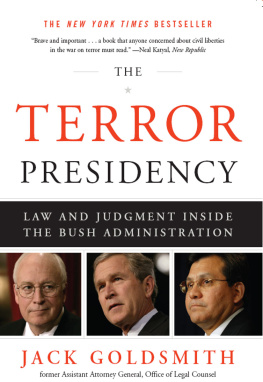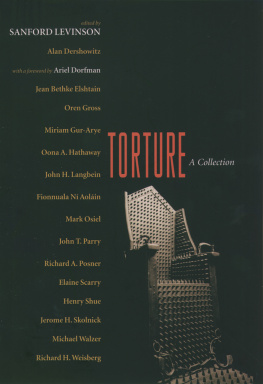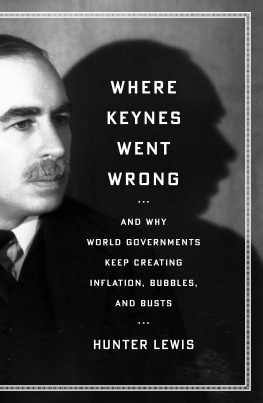Being and Truth and Introduction to Metaphysics by Martin Heidegger (translator, with Richard Polt)
BECAUSE IT IS WRONG
Torture, Privacy and Presidential Power in the Age of Terror
CHARLES FRIED
AND
GREGORY FRIED
labbiam fatta tutti noi

W. W. NORTON & COMPANY
New York London
Copyright 2010 by Charles Fried and Gregory Fried
All rights reserved
For information about permission to reproduce selections from this book, write to Permissions, W. W. Norton & Company, Inc., 500 Fifth Avenue, New York, NY 10110
Library of Congress Cataloging-in-Publication Data
Fried, Charles, 1935
Because it is wrong: torture, privacy and presidential power in the age of terror /
Charles Fried and Gregory Fried.
p. cm.
Includes bibliographical references.
ISBN: 978-0-393-08040-7
1. TortureMoral and ethical aspects. 2. TerrorismPreventionMoral and
ethical aspects. 3. United StatesPolitics and governmentMoral and ethical
aspects. I. Fried, Gregory, 1961II. Title.
HV8593.F75 2010
172.2dc22
2010019096
W. W. Norton & Company, Inc.
500 Fifth Avenue, New York, N.Y. 10110
www.wwnorton.com
W. W. Norton & Company Ltd.
Castle House, 75/76 Wells Street, London W1T 3QT
1234567890
Dedicated to the memory of
Leszek Kolakowski (19272009)
and to
Samuel, Jonah, Nicholas, Eliza, and Allegra
CONTENTS
LIST OF ILLUSTRATIONS
PREFACE
This is a book born of conversations. Those conversations began between a father and son in the days and weeks after 9/11 and continued on into the years that followed. One of us had been a supporter first of John McCain, then of George W. Bush in the 2000 election. The other certainly was not. One of us supported the war in Iraq, the other only reluctantly. But we were both angered and worried by the 9/11 attacks, and our conversations increasingly focused on two controversial tactics in the war against the terroristsbrutal interrogations of suspected terrorists abroad and pervasive electronic surveillance at hometactics used to get desperately needed intelligence about a hidden and unfamiliar enemy. Both divided opinion in this country. What we realized they shared is the question of whether an executive has the right to break the law in a time of crisis, for both were indeed illegal. The public controversy about these tactics continues, as does the controversy about what to do with those who ordered and carried out what surely were crimes.
Those are the things we talked about. The questions are timely; we soon discovered that the issues they raised are timeless. The father, a law professor, and the son, a philosophy professor, each had occasion in their lectures, their classroom discussions, and their writing to carry on those conversations with many other participants and audiences. In the spring of 2008, after we participated in panel discussions together at Suffolk University in Boston, we realized that these conversations might become a book that we could write together.
Although both of us have written on ethics for academic audiences, we made it our goal in this book to write for a general audience. We did so because we believe that what is at stake is who we choose to be as citizens of a republic. Though today we are liable to forget it, ours is a nation founded in philosophy; the founders were steeped in philosophical debates over the basis of law and rights, and they respected their fellow Americans well enough to frame the founding documents and Constitution in the terms of those traditions. We believe that we as a nation now face challenges to our founding ideas as serious as at any time in our history. The conversation, therefore, should be as wide as possible and not confined by the narrow habits of scholasticism.
At the heart of the questions we address in this book is one of the major approaches to ethics in the philosophical tradition. Although it goes by a technical name, deontology, it represents the way many people respondand always have respondedto ethical questions in ordinary life. Deontology comes from the Greek deon , it is necessary, it must be done. An ethics based in deontology lays down commands: it says that we must do a certain thing for no other reason than because it is the right thing to do, and it commands that we not do other things for no other reason than because they are wrong. For deontology, the standard of action is not that the result of a particular act may be good or bad, but that the act itself, apart from any consequences, is inherently right or wrong. The opposing way of thinking is also familiar and goes by the technical names consequentialism and utilitarianism . It argues that no act is inherently right or wrong in itself and that the standard of right action must always be the net good produced and the net evil avoided.
While we do not make the contrast between these two approaches at the theoretical level the centerpiece of this book, we should candidly tell you that both of us have, in our respective work in moral and political philosophy, generally supported a deontological position. We have tended to believe and to argue that some acts and institutions are wrong, and others are right, simply because of the kind of acts and institutions they are. We also believe that the founding philosophy of our republic, with its insistence on inalienable rights and sacred duty, is grounded in deontological principles, in particular, the respect for the human being as having a liberty and a dignity that must not be violated by states or individuals, at least not without cause, and even then, only within limits.
We must also acknowledge something else, something that has haunted our conversations since 9/11: the recognition that, at least as a matter of historical fact, our commitment to absolute principles has faced enormous pressure in the years of war that followed the attacks on New York and Washington. In fighting our present enemy, we as a nation have pushed up against the limits of our commitment to norms that we had previously taken for granted. Torture: can it be justified to prevent catastrophe? The violation of privacy: might it be necessary in an age when hyper-technologized systems of information and communication can be used to plan attacks? A presidency unbound by law: is that what we need to respond flexibly and effectively to extraordinary and unanticipated threats?
In addressing these questions, we believe that it would be bad faith to pretend that our traditional sense that some things are simply wrong has not been pushed to its limit. This is not to say from the outset that we must capitulate to that pressure, but we must take it seriously, we must think it through. We wanted to write a book for fellow citizens, and particularly for those engaged in public service, be it in the military or the government, who find themselves running up against those limits in the crises we now face and may continue to face in new and unexpected forms. It does no one any good to pretend that we are not confronted with decisions that go to the very foundations of the republic, even if the dust and fear of 9/11 have seemed to settle and the battle lines pushed back to Iraq, Afghanistan, and other regions even more remote from our everyday lives.

